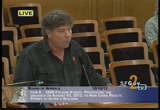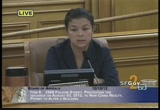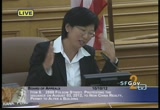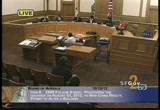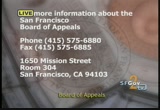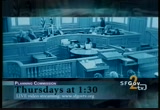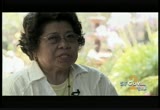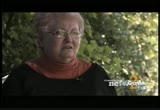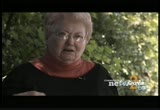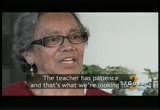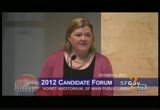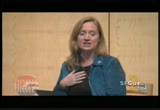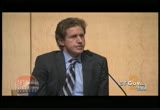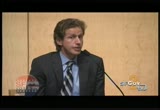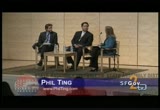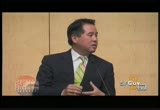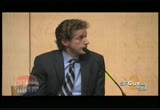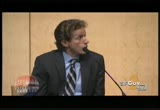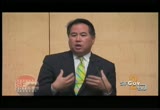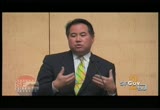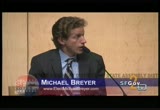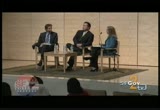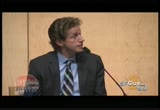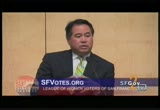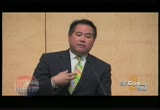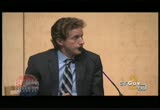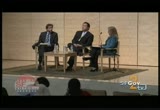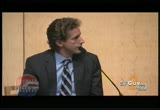tv [untitled] October 10, 2012 7:30pm-8:00pm PDT
7:30 pm
be. the bottom line, if i try to argue this is a legal unit, there's only one way i can do it and i have to go to mr. sweeney, the chief inspector, he's going to ask me where are the permits. that's all he wants to know. it doesn't matter what the assessor says, it dosment matter what the client says, there are no permits for anything that's down there. all the research i found showed it was legally a two unit building, converted to 6 units. there's a cfc that says it's a 6 unit building. any questions? >> anything further from the department? no, okay, commissioners, the matter is submitted. >> i mean, to me it's pretty
7:31 pm
clear that the unit is illegal and needs to be removed. i'm troubled by the timing, i'm troubled by the acceptance of rent and what looks to be the timing with respect to the one year lease and i don't know if there's anything we can do, but i believe that the permit itself needs to be upheld. >> i would agree with that. you know, it's really troubling to hear that and i think the remedy is probably in the landlord-tenant context for the tenant here. but it does trouble me that the rent was accepted and that there is this claim that there was a lack of knowledge because this property owner is not a professional land lord. so that is all troubling to me. unfortunately i think that the right thing to do is to remove the unit and perhaps the remedy lies elsewhere for the tenant
7:32 pm
here. >> i concur. the sentiments, i'm trying to think of the remedy. >> good tenant would have his rights with the rent board of the city. >> i know, i'm just trying to think of my other --. >> i don't think we can condition. >> no, no, no, i'm just trying to think of -- you know. it's not -- okay, forget it, i'm just thinking, that's all. yeah, i mean i think that the acceptance of rent makes it a harder case. i think, you know, at the same time if there is a one-year lease and the lease would be expired at that point in time anyway, then everyone would be within their rights but refusal to pay relocation costs makes me uncomfortable or at least coming with some kind of
7:33 pm
compromise to split the difference perhaps. that's just on the equities and i think he can quilts matter. those are just my thoughts for now. >> is there a motion? >> i move to deny the appeal. >> we have a motion, then, from commissioner lazarus to deny this appeal and uphold the permit. on that motion, vice president fung. >> aye.
7:34 pm
7:37 pm
7:38 pm
>> the digital divide is essentially the divide between those who have access to these digital tools and those who don't. >> these young people is having computers and i just don't know, they're doing it fast. so, i want to know. >> not knowing how to navigate the internet is at a loss of what to do. >> we don't have a computer. >> we are non-profit that unites organizations and volunteers to transform lives through digital literacy. our big right now is the broadband technology opportunity program, a federally funded project through the department of aging
7:39 pm
so we're working in 26 locations, our volunteers are trained to be tutors and trainers offering everything from basic classes all the way to genealogy and job search. >> to me, a computer aon auxiliary brain, it's like knowing how to use your brain, how important is that. i think it's important and possibly seniors, it's important for them to stay in touch. er >> people like facebook or skype so they can connect to their family members or see their family member's albums from far away. >> (speaking spanish).
7:40 pm
>> what we like to focus on is transferring skills from volunteer to learner to help them get on to facebook, find housing on craig's list, being able to connect with friends and family. >> i decided teaching them what i knew and that got me into wanting to give back and to learning more and how it works. >> i discover -- i discovered that seniors need a lot of review. >> i am beginner so little by little, i learn a lot now. >> i learned just the basics, if you get the basics, you can learn it, if you don't get the basics, you're lost. >> it's simple, it's easy, once you know it and that's what i want to learn, how to make my life easier and more knowledgeable with a computer.
7:41 pm
>> so, what we need right now are more people who speak languages other than english or in addition to english, who can give their time during the day and who care deeply ideally about helping to close the digital divide. >> you know, its's a humbling experience, it could be something simple to us in our daily lives but to someone that doesn't know and to help somebody gain that experience in any way, it's awesome. >> (speaking spanish). >> no matter how tired or cranky or whatever i miekt feel when i walk into this class, i walk out feeling great. >> if you feel comfortable using a cuter and you have patience, we want you on our team. >> with they showed me how to do skype.
7:42 pm
>> will you help me learn more? >> jennifer wagner. jnny first joined the league in san francisco in 2001 and has since volunteered in many roles at the local, regional and state and nation levels she currently volunteered as the president of the league of woman voters of california, and is a small business owner here in san francisco. she holds a degree in government, from claire mont college and a policy. >> good evening, everyone, candidates. >> good evening. >> this year we have two candidates for state assembly state 19, michael brior and phil tim. >> they will answer questions
7:43 pm
that you in the audience submit as well as the questions submitted to the league of women voters. in addition, the viewers from the senior center may submit questions on-line. the time keepers will hold up a yellow card to signify to the candidates that they have 15 seconds remaining and hold up a red card when it is time to stop. >> both have asked the supporters to be respectful of the candidate and the audience and to maintain the quiet during the forum, i also ask you to respect this commitment, please. >> you all have many important decision to make on november 6th, and today's forum will give you the opportunity to ask questions to help you make your decisions. now, let's begin. >> our first question is a very general... actually i want to start with one here that is from the richmond senior center sent in on-line.
7:44 pm
>> the census data, and we are going to start with mr. brire >> data shows that many are adults with disabilities or seniors it is expected to grow to 25 percent by 2020, do you feel that you understand the needs and challenges of seniors and adults with disabilities in district 19? what do you think we worry about and how will you help us to stop worrying? >> so, absolutely, while i am a young person, i do believe that we really have an obligation to protect our seniors. and when you see services to seniors being cut, you have to realize that they have contribute to the system their entire life and this is a time that they need services even more than other moments. and when you look at what is
7:45 pm
going on, you also have to say that there is the statistic that you gave is actually the start of the baby booming population, as she growing older. so we actually need more and more services, we need to actually have people trained to provide those services as well. and so, i think, of my great aunt, who is 94 years old, who is i speak to as much as i can, when i think about what the senior population is going through and really care about their children and their future as well. >> thank you, mr. bryer. >> first off, thank you to the league of women voters and jr. voters for hosting this discussion tonight very glad to be here. i think of my grandmother and the amount of work that it took to take care of. we had an enormous amount of support from inhost services and i think about the california budget which has a $20,000 budget gap and the inhome services was one of those services that was cut
7:46 pm
where it was decided that we could not provide seniors care at home. instead, they are now going to the emergency room and seeking much more expensive healthcare. we need to do a whole list tick approach and cut back the safety net that we have been cutting. and we need to make sure that we honor or seniors by making sure that they are taken care of during their later years in life. >> so a related question starting you mr. ting. >> retirees are faced with threats from their benefits from under funded pension funds what would you do to stop this from happening in the future and how do you make them live up to their obligations >> that is a great question, someone who is a fiscal question who has been working hard to make sure that the city and county of san francisco does everything possible to leave up responsibilities my
7:47 pm
office help to bring in above the budget due to the hard work of our office. pensions are a major issue not only in san francisco and the state. part of the work that we did last year where we worked with labor unions and unix to debate and discuss and dialogue and we found a pension proposal that we could bring forward to the voters in the city and county of san francisco which was passed and we know that that is not the final step that the first of many things that we are going to have to do to make sure that we have a balanced budget. the worst thing that we can do is to make sure that we need to make sure that pensions are going to be there for people when they retire and we need to do everything possible to make sure that we live up to the obligations that we promised people when they started working. >> mr. bryer. >> pension is something that is critically important for the state. and we have huge obligations in the pension funds that have been unfunded and right now we
7:48 pm
are assuming something like a 7 and a half percent on pension returns when the private sector the returns are, you know, anticipated around 4 percent. and so this is an area where we have to be honest about how can we insure that people who have worked and who have contributed are going to have pensions in the future? and so, we really have to, approach i got very excited about was what i redid in san francisco, it is one of the reasons that i started the drafted campaign and he worked with the unions to really be honest with how our system is going to be funded for not just in five years or ten years, but for the next generation. paramount importance. >> so expanding on that question, mr. bryer. >> what do you think can be done to address some of the systemic problem with the states' finances? >> we have to do a number of
7:49 pm
things. i mean, we literally are in a fiscal crisis. we have cities in the state going bankrupt. we have incredible challenges on our hands. and we have to increase revenue. we have to decrease costs. which are popular and which are a necessity. but most importantly we have to grow the economy. and so there are a host of host of measures in each of those areas that are absolutely critical for our future and they are not easy decisions to be making but we have to make them sooner rather than later. because if you just pass the buck, it is the next generation who is going to be holding the bag. and in my mind, that is why i am running. it is really to look out for the children who are not voters, who are not being actually considered in my mind as much as they should.
7:50 pm
>> thank you. >> mr., chig how would you address the state's financial problems? >> we are about a hundred billion dollar budget here in california. we spent about a hundred billion and we bring in $80 billion revenue and that is a $20 billion budget gap, the fastest way for that is to grow jobs, we created clean, green collared jobs and brought jobs from overseas here into san francisco. she is are models that we can take to continue to grow our economy. unfortunately that is not going to be enough. we have to also look at ways to raise revenue, that is why i am in support of our governor's tax measure because it brings critical funding to schools. that is why i am supportive of making sure that we are cleaning out and becoming more efficient through what i have done through office and to make government much more receptive
7:51 pm
and efficient. >> that leads into the question about civic engagement. it is critical that people are engaged to have a safe, strong and vibrant state. what have you done and what will you do to encourage the kind of participation that you are talking about. >> i think that transparency and disclosure are some of the main reasons that we have so little citizen participation, that is one of the reasons that i started up we stand san francisco it is an on-line society to engage citizen and order people to get more involved in government so that we cannot just have a conversation here, where people could make it, if people could be part of that conversation on-line, just like all of the folks at the richmond senior sen center, so they can participate. i think that what is lacking in government at times is really making sur that citizens have the information, and they are digestable information and so few people when they pay property taxes one of the
7:52 pm
biggest checks they write every year, most people could never describe where the money goes. we have to make sure that we offer more transparency and more disclosure in giving the citizens more information to make the right decisions. >> thank you. >> mr. bryer what have you done and what would you do to encourage engagement? >> i started a big over ten years ago and really what it is about, it is about applying innovation or the first public wifi network in the world and we broadcast courtroom proceedings it is about transparently in government and education we. have over 70 law schools and students who have unlimited access to this level. and so in large part, what we are trying to do, or what i have done, is tried to restore faith here in our government institutions by seeing how our court system works. your court system is not perfect, but when people see how our jury system actually works and learn about that, it is one step closer to again,
7:53 pm
reengaging a citizen in government. and we have to use technology, it is one of those credible tools that while people are disenfranchised in what is going on in sacramento with the lack of transparency, we can have a much more service-oriented government that reengages people. >> so speaking of service orientation, what do you think that the government should do? and where should the government step aside? >> in terms of... >> what do you think is the role of government? it is a very general question. >> so, the role of government is to provide basic services that the private sector would just not provide. i mean, education, i mean, it is infrastructure, that means social services that means, giving people basic tools that they might not otherwise have. so really giving people in my
7:54 pm
mind an opportunity to succeed. and when the private sector, which can fall short in many areas are not providing, you know, basic services like food, or housing, or that is the role of government to step in. and we have to, we have to restore faith in our system of government. because if people do not believe that the government will spend money well, than it will not improve key infrastukt tur projects that the state needs to do. they need to invest in the roads because the private sector is not. >> thank you. >> mr. king. how would you describe your views on the role of government? >> i think that the government provides some of the most critical services that we lie on every day, we walk on the sidewalk and get on a bus and drop our kids off at schools, many of the things that we take for granted. i wake up, i brush my teeth and water is there provided by our
7:55 pm
incredible water department. these are critical city service and state services that we rely on every day. the government has formed the back bone of our economy like the university of california which i am a proud graduate off. we have been able to grow the tech industry thanks to uc berkeley, and the bio tech thanks to uc sf and san diego. and we need to continue to invest in our future and investing in education and investing in uc, and making sure that those intaoutions are protected. i think that government needs to step out by making sure that we are not being overly burdensome. i think that we make the citizen and businesses go to too many places at times. i think that there is a significant amount of bureaucracy that could be cut. >> you mentioned that education is one of the things that government has to be responsible for. >> california used to have a education system that was the
7:56 pm
envy of the system how do we get it back >> we get it back through funding it. from kindergarten to my time at uc berkeley, i just started dropping off my daughter at kindergarten this year and i am concerned about the state of public education. we fund our kids about $8,000 per pupil that feels like a lot of money, compare that to new york, new jersey, massachusetts, and you are talking anywhere between $14,000 to $15,000. almost double what california is. that is a tra vesty. i think that if you look at the fee increases for uc and higher education it is a absolute crime that we are divesting in our future. we need to make sure that we invest in education. education is the way that we grow our economy. and it is the way that we grow our jobs and to make sure that we invest in all of the future. i was an investment. >> california invested in me and my education.
7:57 pm
>> mr. bryer, how do we get that great reputation back for great education. >> the first thing is that i agree that we have to fund our schools, first and foremost, that is not enough. we have to improve our school system and my grandfather actually one of the first people that i was told to originate the education code he would be turning over in his grave to see that it was 5,000 pages more than any other state, texas is next with 3,000. we have to have sacramento stop from tying up our schools from making decisions and i think that we have to encourage good teachers and career paths and higher compensations because there are great, talented teachers. we have to have 100 percent transparency in budget and have the schools that are funded. funding so complicated that no one can explain it simply. we have to do a host of measurements. we have to tell students what they need to take in order, and
7:58 pm
what classes they need to take in order to qualify for your university, right now we are not doing that. parents should know that every child should have the right or opportunity to go to a four-year university. >> this is a question from the audience that is related. >> do you think that community colleges should focus mainly on practical things like training for unemployed workers and upgrading skills for new jobs? do you feel it is the states' role to encourage this? >> i certainly think that job training is a critical aspect and obviously transferring to a four-year university as well and that is a great role. if you look at what is happening in city college in san francisco, it is a travesty. almost 85,000 students are being supported by something like 39 administrators. students were not collecting fees for the classes. they have no idea the cost of different campuses and how they
7:59 pm
operate. and so that is just a case study in how we have to be brave, we have to have people who are willing to be honest and plan ahead. in terms of having community college system which is not only you know, such a critical aspect of san francisco, and almost one in ten people is taking classes there, but is around and is not threatened by something has horiffic as losing their credentials which are being threatened. >> i think that when governor pat brown designed the education, there were three rungs,. and they were absolutely integral. if you cut off one of those rungs you are cutting off a pathway for people to have a better life. if the community colleges don't offer courses where people can ma trick you late to csu or uc, i think that you are ablu
169 Views
IN COLLECTIONS
SFGTV2: San Francisco Government Television Television Archive
Television Archive  Television Archive News Search Service
Television Archive News Search Service 
Uploaded by TV Archive on

 Live Music Archive
Live Music Archive Librivox Free Audio
Librivox Free Audio Metropolitan Museum
Metropolitan Museum Cleveland Museum of Art
Cleveland Museum of Art Internet Arcade
Internet Arcade Console Living Room
Console Living Room Books to Borrow
Books to Borrow Open Library
Open Library TV News
TV News Understanding 9/11
Understanding 9/11